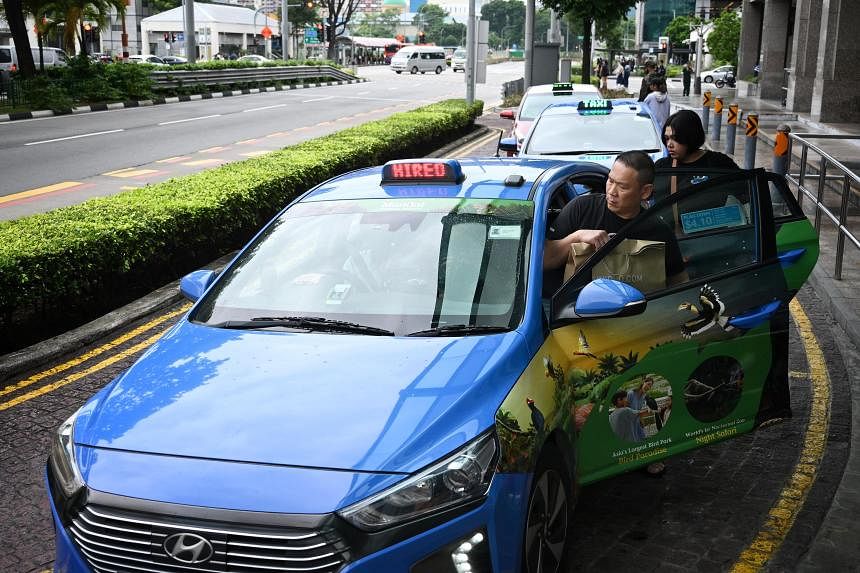SINGAPORE – Proposed regulatory changes to Singapore’s point-to-point transport sector have been met with broad support from the industry, but some taxi firms and transport experts said the new measures may not go far enough to halt the decline in the pool of cabs here.
The changes announced on March 5, which are part of an ongoing government review of the sector, include lengthening the statutory lifespan of non-electric taxis from eight to 10 years and removing the requirement for smaller taxi operators to maintain a call-booking system.
Several of the changes, announced during the debate on the Ministry of Transport’s budget, are aimed at lowering the operating costs of taxis to make them more financially viable, thereby ensuring a steady supply of cabs and street-hailing services here.
The taxi population hit another low in January with a fleet of 13,485 – less than half the 2014 peak of 28,736.
Mr Tommy Tan, chief executive of ComfortDelGro Taxi, Singapore’s dominant taxi operator, said the new measures are positive steps towards a more level playing field. “Any cost savings we are able to identify, we will look at passing these benefits on to our cabbies.”
Mr Tan said the ability to keep existing taxis on the roads longer will help to reduce the acquisition cost of new vehicles, especially with the high certificate of entitlement (COE) premiums now.
He welcomed the Government’s plans to streamline the curriculum for taxi driver licences, noting that it now takes twice as long to obtain one, compared with a private-hire driver licence.
“We hope that the Government can consider further measures to reduce operating costs and lower barriers for drivers wishing to join the (taxi) industry,” Mr Tan added.
Mr Clarence Lew, deputy chief executive of taxi firm Strides Premier, also urged the authorities to do more. “We are appreciative of these new measures, as they represent the first step in the right direction. To attract more taxi drivers, it would require further reduction of statutory (costs) and other costs.”
Mr Lew did not specify what these costs are, but some of the other regulatory expenses taxi operators have to bear include licensing fees and road tax.
While the lifespan extension for taxis will increase maintenance costs, there will be overall gains, he said. This is because taxi operators can spread the cost of the vehicle over a longer period and reap savings.
Mr Lew said Strides Premier intends to share these savings with hirers of older cabs.
Although Strides Premier will no longer need to take taxi bookings through phone calls, the company will maintain a call centre for such bookings.
Mr Neo Nam Heng, chairman of diversified motor group Prime, which operates Prime Taxi, said the new measures came after several rounds of discussions, and he is glad the authorities listened to feedback.
Prime is Singapore’s smallest taxi operator, with about 530 cabs, including a sizeable number of limousine taxis.
Mr Neo said the company needs six to eight workers to run its call-booking system, and the expenses run up to several hundred thousand dollars yearly. “It is not that big an amount, but saving this helps to cover some of our operating costs,” he said.
Mr Neo added that the proposal to extend the lifespan of taxis comes at the right time, given the high COE premiums and a shortage of new vehicles from Japan.
Still, the industry veteran too said more can be done.
He suggested allowing permanent residents above a certain age to become taxi drivers, which would help inject new blood into the sector. At present, only Singaporeans aged 30 and above qualify for a taxi driver licence.
“Taxis are a must. We still play a very important role,” said Mr Neo.
ST has contacted taxi operator Trans-Cab for comment.
Economist Julian Wright from the National University of Singapore (NUS) said removing unnecessary burdens on taxi firms will help ensure people with difficulty using ride-hailing apps can still flag down cabs.
Concurrently, he said it would be good if ride-hailing firms can better cater to the needs of seniors, for instance, by offering simpler elderly-friendly versions of their apps or call bookings using AI voice agents to reduce waits and costs.
“Most elderly have mobile phones, but many may still struggle to use ride-hailing apps. New solutions should be considered,” Professor Wright added. He noted how Uber offers a toll-free number in the United States for seniors to request a ride.
NUS economist Timothy Wong said extending the lifespan of taxis will lower leasing costs for drivers, but he does not expect a surge in sign-ups as a result.
Instead, a more drastic policy change that would have a larger effect is to allow taxis to be bought at a discount on COE prices on the market, he said.
Associate Professor Walter Theseira, head of the urban transportation programme at the Singapore University of Social Sciences, said taxis have become less competitive since the entry of private-hire vehicles.
For instance, drivers may prefer the flexibility of using private-hire cars, which, unlike taxis, can be used for private purposes too.
Prof Theseira said the benefits given to taxis – such as a monopoly over street-hailing and their ability to pick up any type of fare – have not been enough to make up for the downsides of operating a cab, compared with a private-hire car.
In his view, the moves to lengthen the lifespan of cabs and change the inspection regime for taxis and private-hire cars may not move the needle. “I’m not that optimistic that this will halt the slide away from taxis,” he said.
Ride-hailing firm Grab said the Government’s plans to raise the frequency of inspections to half-yearly for private-hire cars more than 10 years old will likely add to its drivers’ operating costs.
But the company said it recognises the proposed change is to ensure that these older vehicles are functional and do not pose safety risks.
Grab said it has consistently met the standards for first inspection passing rates, and it does not have plans to reinstate a 10-year age limit for private-hire vehicles on its platform that was lifted in 2023.
Ride-hailing firm Ryde said it regularly assesses the condition and performance of vehicles on its platform, including older cars.
Going forward, all taxi and ride-hailing operators must notify passengers, drivers and the Land Transport Authority (LTA) within an hour of any systemic incident that could impair services.
On this, Ryde said it anticipates some “operational adjustments”. This will entail enhancing the quality of its service by improving its processes, for example.
Ryde and Grab, however, said they are confident they can meet the new standards.
Ryde said it also supports LTA’s efforts to improve the accessibility of ride-hailing services for wheelchair users and young families needing a child seat, but it expects some challenges during the roll-out. For example, the changes will require apps to indicate if a matched vehicle can accommodate the needs of these users.
“Further app interface improvements will be made for such options to be more prominent,” the company said. It will also invest in driver training and explore ways to educate riders on choosing suitable services.
Gojek said most vehicles on its platform have enough boot space to accommodate a wheelchair, and the company’s GoCar Kids service is for customers travelling with young children.
“We believe the upcoming changes around improving the matching of consumers to the correct service type will further ensure that consumers book the right service for their needs,” it said.
“As the Government looks to narrow the gap in regulations between private-hire cars and taxis, it will be useful to align other existing policies as well, such as the policy on child seats, eligibility criteria for drivers and the use of taxi stands,” it added.
LTA said on March 5 it will work with ride-hailing firms to make their apps more elderly-friendly and explore providing pick-up points that both taxis and private-hire cars can use. This is part of the next phase of its review, which will be completed by the second half of 2024.


